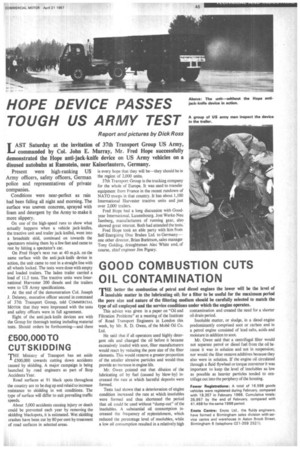GOOD COMBUSTION CUTS OIL CONTAMINATION
Page 47

If you've noticed an error in this article please click here to report it so we can fix it.
better the combustion of petrol and diesel engines the lower will be the level of insoluble matter in the lubricating oil; for a filter to be useful for the maximum period the pore size and nature of the filtering medium should be carefully selected to match the type of oil employed and the service conditions under which the engine operates.
This advice was given in a paper on "Oil and Filtration Problems" at a meeting of the Institute of Road Transport Engineers in London this week, by Mr. R. D. Owen, of the Mobil Oil Co. Ltd.
He said that if all operators used highly detergent oils and changed the oil before it became excessively loaded with soot, filter manufacturers would react by reducing the pore size of the filter elements. This would remove a greater proportion of the smaller abrasive particles and would thus provide an increase in engine life.
Mr. Owen pointed out that dilution of the lubricating oil by fuel (caused by blow-by) increased the rate at which harmful deposits were formed.
Tests had shown that a deterioration of engine condition increased the rate at which insolubles were formed and thus shortened the period that oil could be used without "dump-out" of the insolubles. A substantial oil consumption increased the frequency of replenishment, which reduced the percentage level of insolubles, while a low oil consumption resulted in a relatively high contamination and created the need for a shorter oil drain period.
Insoluble matter, or sludge, in a diesel engine predominantly comprised soot or carbon and in a petrol engine consisted of lead salts, acids and moisture in addition to soot.
Mr. Owen said that a centrifugal filter would not separate petrol or diesel fuel from the oil lxcause it was in solution and not in suspension; nor would the filter remove additives because they also were in solution. If the engine oil circulated through a fluid flywheel or torque convertor it was important to keep the level of insolubles as low as possible as heavier particles tended to centrifuge out into the periphery of the housing.
Fewer Registrations: A total of 16,598 goods vehicles were registered during February, compared with 19.357 in February 1966. Cumulative totals: 35,957 by the end of February, compared with 41.468 for the same 1966 period.
Enots Centre: Enots Ltd., the fluids engineers, have formed a Birmingham sales division with service centre and warehouse in Aston Brook Street, Birmingham 6 (telephone 021-359 2521).




































































































































